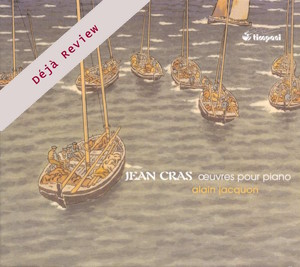
Déjà Review: this review was first published in October 2002 and the recording is still available.
Jean Cras (1879-1932)
Danze (1917)
Paysages (1917)
Poèmes Intimes (1902/11)
Alain Jacquon (piano)
rec. 1995, Théâtre de Poissy, France
Timpani 1C1033 [68]
Like Rimsky-Korsakov, Albert Roussel and Antoine Mariotte, Jean Cras was a naval officer, but unlike any of them he spent all his life in the French navy and ended his career as rear-admiral and Major-General commanding the port of Brest. Music, however, was an important and vital facet of his life. He was the only pupil of Henri Duparc and had a thorough musical education. He was far from an amateur. He composed regularly and his output includes piano works, chamber music, orchestral pieces and an opera Polyphème. Moreover, like Le Flem and Ropartz, he was a Breton at heart, so no wonder if sea and nature proved important inspirational sources for his music. Not surprisingly too, then, are two of his most personal and characteristic works (the orchestral Journal de Bord [1927] and the beautiful Légende pour violoncelle et orchestre [1929]) deeply influenced by his experience as naval officer and by the legendary Celtic world of Brittany respectively.
His earliest mature piano work Poèmes Intimes was composed between 1902 and 1911. These five character pieces retrace the composer’s musical progress and confirm his growing mastery over all these years. Though most pieces such as En Islande, Au fil de l’eau and La maison de campagne, are nature-inspired, the whole set, however, rather paints what Michel Fleury aptly describes as ‘inner landscapes’. Some of the music, too, has some folk-like simplicity redolent of folk song without actually quoting any real folk-tune. The whole set is also quite revealing as to Cras’ musical journey. Though some pieces, such as Preludio con fughetta, may still call Franck to mind, much of the music already points towards Cras’ mature style, impressionistic after Debussy’s model and often modally inflected. While quite satisfying, musically speaking, Poèmes Intimes is a fascinating record of the composer’s forging his own musical personality.
The short diptych Paysages gives ample proof of the composer’s newly gained maturity. The first panel Maritime is a beautifully atmospheric seascape whereas the second one Terrestre has some outdoor jollity suggesting some rustic scene.
The very title of Danze completed in 1917 is rather misleading, in that this is his most ambitious piano work. Each of the four “dances” is a fully developed and intricately worked-out piece of music. The term danze might in fact reflect the exuberance, the freshness and the vitality of the music. It is clear that, from now on, Cras is full master of his aims and means. This is definitely no mere lightweight dance fantasy but rather a substantial work not unworthy the comparison with, say, Ravel’s Gaspard de la Nuit; and, no doubt, one of Jean Cras’s most personal achievements.
Alain Jacquon’s thoughtful, tonally varied and subtle readings serve the music well and are superbly recorded. Michel Fleury’s illuminating and informative notes are excellent. If you enjoyed Timpani’s double-CD set of Cras’s orchestral music (2C2088), you will need no further recommendation; but this magnificent release will undoubtedly appeal to anyone willing to explore some lesser-known and unjustly neglected byways of early 20th Century French music.
Hubert Culot
Help us financially by purchasing from



















